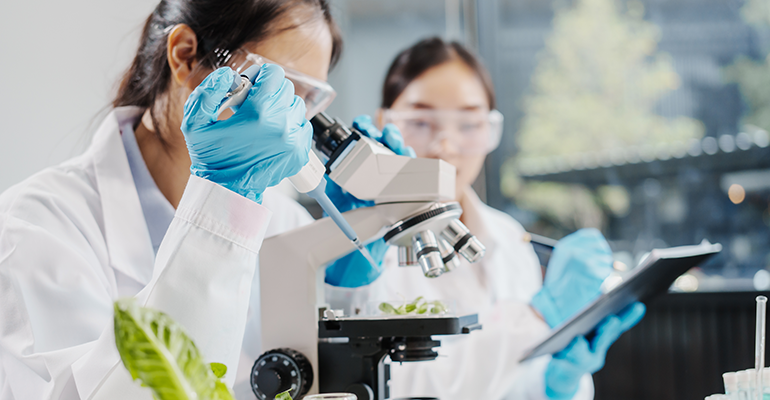News
China introduces new safety requirements
21 Oct 2024A National Center for Food Safety Risk Assessment policy welcomes new application rules for food ingredients from genetically modified microorganisms.

On 13 September 2024, China’s National Center for Food Safety Risk Assessment issued a notice regarding its plans to improve safety evaluation data requirements for three new foods, a move that progresses synthetic biotechnology materials.
Operating under the National Health Commission, the Center announced that these requirements would apply to new food additives, food ingredients, and food contact materials. The National Center is the main institution leading the adoption of the new approach methodologies.
Following this safety evaluation update, new food additives and new food ingredients are now two different terms in China.
In recent years, various approvals for food ingredients produced from genetically modified microorganisms (GMMs) have raised the profile of synthetic biotechnology materials in China. First, in 2017, China announced it would accept GMM’s new enzyme preparation applications. Then in 2021, the country stated it would receive GMM’s new food additive applications. Confirmation that China will accept new food ingredient applications from mid-September 2024 marks the country’s latest move to support GMM-based foods.
New safety requirements
The new policy officially allows the application of new food ingredients, new food additives, and food-related products derived from GMMs. Previously, substances derived from GMMs were not eligible for application as new food ingredients.
“Although China has opened channels for the application of new enzyme preparations and new food additives derived from GMM, the specific requirements for application documents were not clearly defined,” Chris Wang, a China compliance expert from ZMUni Compliance Centre, told Ingredients Network.
Following the announcement of the new GMM-based food ingredient applications, Wang said, “This document clarifies the requirements for application documents, making the review process more transparent.”
Applicants wanting to register their new GMM-based food ingredients must submit relevant materials as per the Requirements for Safety Evaluation Application Materials for GMMs Used in Food Processing. The application primarily includes product information, relevant information on GMMs, safety evaluation of the recipient microorganism, and the safety evaluation of genetic modifications.
Food brands and manufacturers need to ensure the final product does not contain residual exogenous genes or live cells of GMMs. Previously, when applying for products with GMMs, the authority required evaluations from two regulatory authorities: the National Health Commission and the Ministry of Agriculture and Rural Affairs. “Now, for Class I and Class II products, only an evaluation and approval from the National Health Commission is necessary,” said Wang. “This document optimises the application process, accelerating the approval timeline,” Wang added.
Biotech developments spur new GMM food focus
Consumer demand for new food ingredients is on the rise, including calls for healthier and more sustainable products that can be produced through genetic modification technology.
“With advancements in biotechnology, genetic modification techniques have become increasingly mature and many GMM-derived food ingredients have been proven safe and approved for use in multiple countries and regions,” Wang explained.
“Relevant departments in China are gradually establishing a comprehensive evaluation system to ensure that GMM-derived food ingredients entering the market have undergone rigorous safety assessments and meet national food safety standards,” Wang added.
Since 2021, food companies have been applying for new food additives and new food ingredients in China. “New food ingredients are used more extensively in the food industry compared to new food additives and can be said to have greater market value,” said Wang, adding that the voices from businesses are very strong.
At the same time, the application process for new food additives derived from GMMs has been open for three years, enabling the country’s health and agricultural services to gather data and insights. Based on the accumulated review experience over these past few years, the National Health Commission and the Ministry of Agriculture and Rural Affairs have gradually agreed on the review requirements. The regulatory authorities have responded to an increasing demand for approvals and aim to act in alignment with industry development needs.
“The regulatory authorities have expedited the approval process by clarifying the requirements for application documents and directly conducting safety assessments for certain new food items involving GMMs through the National Health Commission,” said Wang.
Significance of GMM-based foods
Opening applications for GMM-derived food ingredients marks a significant step toward fostering innovation in the food industry. Wang explained that alongside promoting research and technology advancements, it will enable the development of safer, healthier, and more sustainable food products.
Through a robust regulatory framework, the government ensures strict safety assessments and protects consumer health. This initiative also supports industrial growth by creating agriculture and food processing opportunities, aligning with international standards, and boosting global trade, Wang added
“It also addresses consumers’ evolving demands for diverse, nutritious foods, contributing to economic development and environmental sustainability,” said Wang.
Impact on manufacturers
China’s introduction of safety evaluation data requirements for three new foods hopes to open up opportunities for manufacturers. “The policy opening, along with the market’s focus on synthetic biotechnology companies, is expected to encourage more domestic enterprises to invest in the application of synthetic biotechnology in the food industry,” Wang noted.
Due to this new requirement, the food sector in China also anticipates a significant increase in applications for new food ingredients derived from synthetic biotechnology.
Related news

Future F&B flavours favour exploration and explosive taste profiles
25 Mar 2025
Exploration and experimentation will define the future of flavour, according to Mintel, as consumers seek out taste profiles and textures that offer an adventurous eating experience.
Read more
Partnership plans to scale cultivated meat production
21 Mar 2025
Food technology innovator Ever After Foods (EAF) and multinational food leader Bühler are striving to overcome hurdles to access and accelerate the development of cultivated meat.
Read more
Global consumers enjoy food less and perceive it as less healthy
20 Mar 2025
Enjoyment of food and its perceived healthiness is dwindling among most global populations, according to findings from Gallup and Ando Foundation/Nissin Food Products.
Read more
Seafood set to ‘dethrone’ poultry as protein growth king
19 Mar 2025
Seafood is poised to surpass poultry as the leading contributor to global protein supply growth this year, according to Rabobank’s latest protein outlook.
Read more
Tariff volatility leaves food manufacturers in limbo
11 Mar 2025
Rapid US trade policy shifts and tariff escalations are creating uncertainty for food manufacturers and ingredient suppliers.
Read more
F&B industry hit with fresh greenwashing claims
26 Feb 2025
The food and beverage (F&B) industry is under fresh scrutiny amid claims of greenwashing, with Arla the latest company in the firing line.
Read more
Protein diversification: A massive missed market?
20 Feb 2025
Germany and the UK could be missing out on the massive market for alternative meats and proteins, with one new coalition calling for an end to the “steak-tofu struggle”.
Read more
Have scientists discovered a new tool to measure UPFs?
19 Feb 2025
Researchers have developed a new scoring system and database, compiling over 50,000 food items, of which over 1,000 are classified as ultra-processed.
Read more
China ramps up cultivated meat research with new innovation base
18 Feb 2025
China has opened its first fermentation and cultivated meat research centre in Beijing.
Read more
Most consumers lack trust in AI, but supplement users are ready to embrace the technology
14 Feb 2025
A survey of UK and US consumers found that most supplement users are willing to let AI make decisions on their behalf, but they also demand greater transparency.
Read more